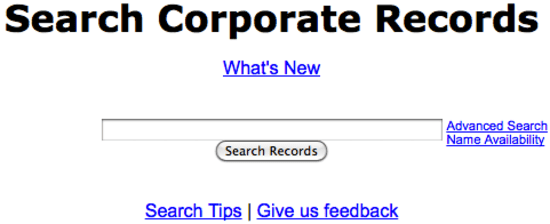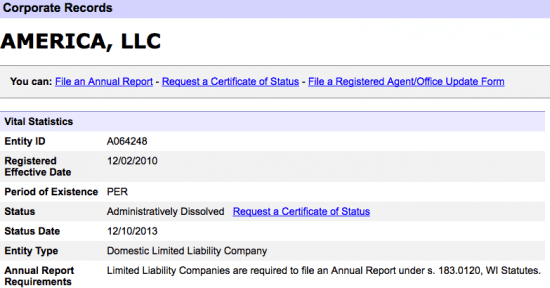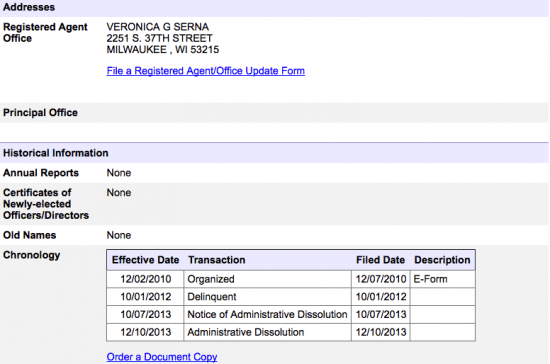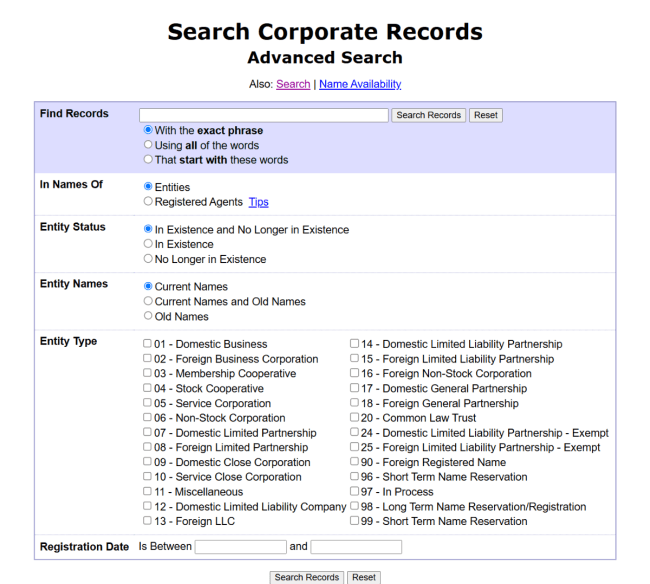How to Conduct a Wisconsin Business Entity Search
Read our step-by-step guide to running a Wisconsin business search to learn more about companies on file with the state or check name availability.

Last Updated: July 10, 2025
The Wisconsin corporate records search, sometimes called the Wisconsin business name search, is a valuable resource for anyone who needs to learn more about existing business entities in the state. Whether you’re an established business owner who needs to request a Certificate of Status or a soon-to-be entrepreneur who needs to check name availability before completing the Wisconsin business registration process, this is a go-to resource.
But using the tool can feel a little overwhelming, especially if you’ve never used one before. That’s where this guide comes in. We’ll walk you through the essential steps to using the search. We’ll also discuss Wisconsin business naming guidelines and what you should do after searching.
Let’s get started.
Wisconsin Secretary of State Contact Information
| Address: 4822 Madison Yards Way, North Tower Madison, WI 53705 | Office Hours: Monday – Friday 7:45 a.m. – 4:30 p.m. |
| Telephone: (608) 261-9555 | Website: https://dfi.wi.gov/Pages/Home.aspx |
Wisconsin Business Name Guidelines
When you’re starting a business, one of the most important things you’ll do is pick your business name. And that means you’ll need to meet all of Wisconsin’s naming guidelines.
First, your name needs to be different from the names of other registered companies in Wisconsin, including both domestic and foreign corporations, limited liability companies (LLCs), limited partnerships, and so on. This is one of the simplest but most important naming standards.
That said, uniqueness isn’t the only naming guideline to adhere to. Here are a few other rules that Wisconsin business entity names need to follow:
- Your business name needs to include a designator. Corporations need to include the word “corporation,” “incorporated,” “company,” “limited,” or an acceptable abbreviation of those words. Meanwhile, LLCs need to include the phrase “limited liability company” or “limited company” (a few abbreviations are also acceptable).
- Your name cannot state or imply that you’re conducting activities that aren’t permitted by law or by your company’s formation documents.
If you’re in a licensed trade or profession, keep in mind that you’ll need to meet any naming rules that your industry has in place, too. If your new business name doesn’t meet these requirements, you’ll need to pick a new one.
How to Search the Wisconsin Department of Financial Institutions Database by Business Name
The Wisconsin business search has three primary search methods: searching by business name, an advanced search, or a name availability search. We’ll walk you through how to use each search option, but in this section, we’ll focus on how to run a simple business name search.
Step 1: Choose and type your search terms
To get started, you’ll need to navigate to the search homepage on the Wisconsin DFI website. You should see a large “Search Corporate Records” heading, pictured below.

For a simple business name search, don’t worry about the “Advanced Search” or “Name Availability” search links. Instead, type in the name of the business you’re searching for into the search bar. For this search, it’s best to use as much of the business name as you know. The more specific your search, the more specific your results will be (but you can search a single keyword, if needed). That said, you should leave off entity designators like “LLC” or “Inc.”
After you’ve typed the name, click “Search” or hit “Enter.”
Step 2: Review your business search results
The search tool will pull up a list of all the business names that match your search terms. For example, here’s what our search results looked like when we searched “America:”

On this first results page, you’ll see the full name of each matching business. You’ll also see the company’s ID number, entity type, effective date, and the status of the business.
If you’d like to see even more information about a particular business, click on its name. You’ll be redirected to the company’s business information page.


On this page, you’ll find more detailed information about the company, including its period of existence, annual report requirements, the name and address of its registered agent (or registered agent service, if applicable), its principal office address, and even its filing history.
If needed, the links on this page will also allow you to request copies of certain official documents, file an annual report, get a Certificate of Status, or even update your registered agent to help you maintain compliance.
How to Run an Advanced Search
The basic search is a good fit if you’re searching a specific business name, but if you’re using a keyword (especially a common one like our “America” example), you might find that your results list is too long. That’s where the advanced search comes in. The advanced search gives you several ways to refine your search criteria so it’s easier to find the result you’re looking for.
Step 1: Set your filters
The first step in the advanced search process is to choose your different filter options, pictured below.

Immediately under the “Find Records” search bar, you’ll see three ways you can tell the tool to function:
- Exact phrase match: This method will retrieve only those results that match your search terms exactly.
- All words match: This method retrieves business names that include all of the words you search anywhere in the business name. For example, if you searched “America” and “Co,” the search would pull up results like “Vanguard America Co.” and “Citizens Watch Co. of America.”
- Start With: This method will only pull up business names that begin with the same word(s) as your search. Going back to our “America” example, this method would only show you business names that start with that word.
This search method also offers a few other filters you can use:
- In Names of: This setting lets you choose “Entities” and “Registered Agents.” The basic search defaults to entity names, but if you know the name of a company’s registered agent, you can use this setting to search by the agent’s name instead.
- Entity Status: This allows you to filter results to include existing businesses, businesses no longer in existence, or both.
- Entity Names: This setting helps you to sort results by the current business names of entities, their old business names (where applicable), or both.
- Entity Type: Last but not least, this lets you limit your results to a specific type of entity. For example, if we added “LLC” to this feature and then searched “America,” the tool would retrieve the names of LLCs that include “America” in their name, and nothing else.
To use the Advanced Search, simply pick the filters that best suit your search goals, type in your search terms, and hit “Search.”
Step 2: Review your search results
After you hit “Search,” this tool functions very similarly to the basic search. The first page will show you all of the business names on record with the Wisconsin Department of Financial Institutions that match your search terms. If no results were found, you’ll get a message to that effect.
You can click on a particular business name to learn more about that company. The business information page will show you the date the company filed its business registration paperwork, its registered agent, and more. You can also view the company’s filing history, request copies, or ask for a Certificate of Status.
How to Search for Business Name Availability
If you’re looking to start a Wisconsin corporation or limited liability company, it’s your responsibility to ensure that your desired business name doesn’t infringe on any existing business names. To do that, you’ll need to run a name availability search.
Thankfully, Wisconsin offers a variation of its corporate records search for just this purpose. To get started, simply navigate to the name availability search homepage.
Next, type in the name you’re hoping to use, leaving off the business designator like “LLC” or “Inc.” Then, click “Search Records.”

Your results will be displayed on the following page, and there are two possibilities. First, if your name isn’t currently on the record, you’ll see a message saying that there appear to be no conflicts.

In contrast, if there are business names that conflict with the one you’ve searched, you’ll see listings for the name (or names) that conflict with yours. If there’s a conflict, you’ll need to make changes to your name or pick a new one before registering your Wisconsin LLC.

What to Do After Searching Business Names in Wisconsin
After you’ve come up with a name and searched it, you’re probably feeling like you’ve done a lot of legwork. You’d hate for that hard work to go to waste, right? Here are some steps you can take to protect your Wisconsin business name and make the most of it.
Reserve your Wisconsin business name (optional)
If you’ve picked the perfect business name but you’re not quite ready to file your business formation paperwork, Wisconsin allows you to reserve a business name.
You can get a name reservation by filing a Name Reservation Application with the Wisconsin Department of Financial Institutions. LLCs and corporations pay a $15 filing fee for this reservation, but some business types pay just $10.
After your reservation form is filed and approved, your reservation is valid for 120 days; you can request a renewal if you need more time. This step is optional, and you should only pursue it if you’ve picked a name but aren’t ready to file your formation paperwork yet.
Form an LLC or register your business
One of the best ways to protect your business name is to register your business. After you register a business under your chosen name, no one else in Wisconsin will be able to register their own company with the same name.
Registering a Wisconsin business is an important legal process. Learn more about starting a Wisconsin LLC.
Get a domain name that matches
You want your customers to find your business website easily. That means you need a domain name that matches your business name as closely as possible. A matching domain will help your brand maintain consistency both in person and online.
If you’re struggling to come up with a domain name (or the one that matches your name is already taken), try using a domain name generator. A generator can help you come up with a domain that matches your brand image.
Set up your business online
Today, you can’t run a business without a good digital footprint. A good business website is a decent starting point. But don’t stop there; set up social media accounts like a Facebook page, a TikTok profile, and an Instagram account. Make sure your business name is included on each account so your brand is consistent across your online presence.
Last but not least, set up a Google Business Profile for your business (or claim it if it already exists). This profile will help you direct customers to your website or your store location. Plus, it’ll help you respond to customer reviews and build a good brand reputation in the Badger State.
Trademark your business name (optional)
If you want the most robust protections for your business name, you could pursue trademark registration. Trademarks can be registered at the state or federal level (with federal protections being the strongest).
Getting a trademark can be pretty complicated and time-consuming. If you go this route, working with a trademark attorney is highly recommended.
Wisconsin Business Resources
Start an LLC in Your State
When it comes to compliance, costs, and other factors, these are popular states for forming an LLC.
Conduct an Entity Search in Your State
Disclaimer: The content on this page is for information purposes only and does not constitute legal, tax, or accounting advice. If you have specific questions about any of these topics, seek the counsel of a licensed professional.
Let's Get Started

